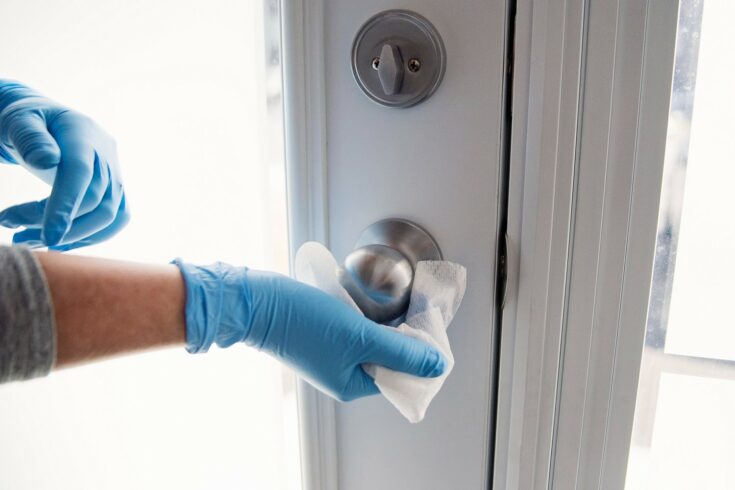From April 2020 we knew that coronavirus can survive on some hard surfaces for up to three days.
Understanding which surfaces were ‘friendliest’ to coronavirus, and why, could help find solutions and slow down or halt its environmental transmission.
UKRI has funded a range of projects to investigate whether there are ways to physically stop the virus in its tracks.
Transmission: establishing an evidence base
The Medical Research Council (MRC) and the National Institute for Health Research (NIHR) jointly funded a project that will provide the evidence base for infection control, with a specific focus on healthcare and domestic settings.
Understanding how the virus spreads in healthcare environments is essential to protect staff, implement infection control measures and reduce transmission.
Mr Allan Bennett from Public Health England is leading the project, which is investigating how long the virus can survive in the air and on different types of surfaces, especially those common in healthcare settings and households.
His team is also looking at whether current air sampling systems and decontamination processes can track and inactivate the new virus.
Invisible films in partnership with industry
Chemical engineers from the University of Birmingham have been funded by the Engineering and Physical Sciences Research Council (EPSRC) to develop antiviral sprays, films and other products.
The antiviral properties could be delivered through additives in existing products like detergents, or integrated into packaging processes, forming an invisible film on common materials.
Project lead, Dr Zhenyu Jason Zhang said:
Scientific work so far suggests that COVID-19 is transmitted via aerosol droplets that not only carry, but very likely protect the virus.
The products we are developing will disrupt such protective environments, leaving the virus exposed and unable to survive once the aerosol droplets land on a communal surface such as a handrail or tabletop.
The products could be delivered through additives in existing products like detergents or added to packaging processes so that they form invisible, long-lasting films.
Critically, the team involves industrial partners so that scientific findings can be rapidly commercialised. Dupont Teijin Film manufactures polyester film that is used extensively for face shields, food packaging and digiprint; Innospec develops and manufactures additives as performance chemicals and FiberLean is a global manufacturer of microfibrillated cellulose used in packaging.
New materials to stop the spread
A team of material physicists and virologists from the University of St Andrews has been funded by UKRI to test different surfaces and coatings and find out whether they can ‘kill’ the novel coronavirus.
Professor Peter Wahl is leading the team and said:
Apart from airborne direct transmission, indirect transmission via surfaces, in particular in public spaces, can play an important role in spreading the disease.
Commonly used materials like stainless steel and plastic allow coronaviruses to survive for a significant amount of time on their surface.
The team is building on existing knowledge about the antiviral properties of copper. They hope the findings will help develop materials and coatings that could be applied retroactively to deactivate the virus and stop its spread in public places.
Last updated: 11 December 2020

